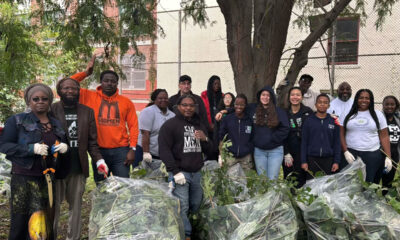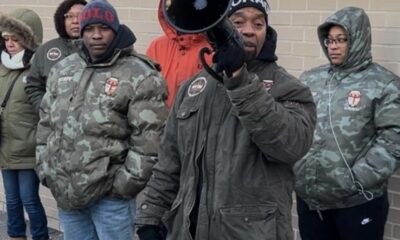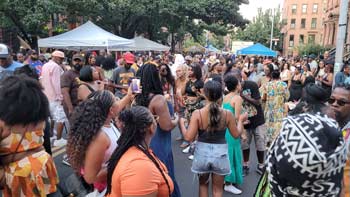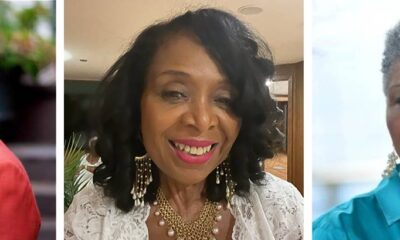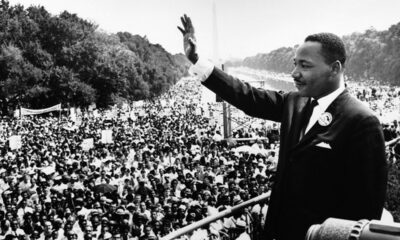featured
NOTES FROM DAKAR- Scholars Send a Message to the World From Brooklyn
It was Super Bowl Sunday, but that was of no matter to the illustrious group assembled to celebrate the life of the great Senegalese historian, Cheikh Anta Diop on the 24th Anniversary of his death. Revered historian of the Nile Valley civilizations, Dr. Yosef Ben-Jochannan was there with his wife, Sister Khepra, co-founder of the First World Alliance, a “communiversity” as Dr. Leonard Jeffries, also present, had christened it. African-centered musician Randy Weston and his wife and others had the privilege of hearing Yaa-Lengi Meema Ngemi, the translator of Diop’s masterwork, Civilization or Barbarism: An Authentic Anthropology, speak on the importance of Cheikh Anta Diop today.

Yaa-Lengi Meema Ngemi (right), translator of Cheikh Anto Diop’s Civilization or Barbarism, remembers Cheikh Anta Diop at a celebration hosted by Dr. Randy Weston at Le Grand Dakar Restaurant in Brooklyn. Photo: Mark Stewart
“His life’s work was to free his people. To give back to Africa the legacy that is Africa.” Ngemi said that Civilization or Barbarism was the book where Diop put together his lifetime’s research. “Diop believed there had to be a change in the African mentality on the continent. In the introduction he says that ‘Imperialism, like a prehistoric monster, first kills the being culturally, spiritually and intellectually before killing us physically. In the denial of the intellectual accomplishments of our ancestors was the cultural and mental death that preceded and paved the way for our physical death both on the continent and throughout the Diaspora.” Ngemi says that Diop made it his purpose to rediscover that knowledge of the ancestors. “Because without it we cannot redefine ourselves worldwide.”
After Ngemi finished the translation, he started to teach about Diop and found that most of the people, people of the Diaspora, did not know Diop’s name. “Cheikh Anta Diop is on a different level spiritually, culturally, and he was a man ahead of his time.” Ngemi refers to Diop’s 1960 work, Black Africa the Economic and Cultural basis for an African State, where Diop contended that Africa had the resources the world wanted and Africa could not only develop itself and compete with the rest of the world, “There is room for all of the Diaspora to return.”
“In this little booklet Diop prophesized as to what was the main problem about us as a people,” said Ngemi. “Diop writes, speaking of his own generation, ‘Historical circumstances now commands of our generation, that it solve, in an expeditious manner, the vital problems that face Africa, most especially, the cultural problem. If we do not succeed in this, we will appear in the history of the development of our people as the watershed generation that was unable to ensure the unified cultural survival of the African continent. We will be the generation which out of political and intellectual blindness, committed the error fatal to our national future.’ That’s what Diop wrote in 1960.”
And here we are, some 50 years later and Ngemi says that cultural identity, which Diop identified as what unites an entire people, “is still what is besetting us. On the continent and in the Diaspora.” Speaking of his own country Congo, Zaire, he said that 10 million have been killed since 1996. “10 million. They continue to die as I speak here. Little girls as young as 9 years old being gang-raped by other Black people, Africans, in Africa, on the African continent. 10 million. Why? Lack of cultural identity.”
Ngemi says that reading Diop’s work has an altering effect, and that there is “a birth of a new person after reading Diop’s work,” and learning “what the world owes to your ancestral genius.”
Easter is still two months away, but a Resurrection is what Ngemi says is the responsibility of conscious African people. “We have to resurrect our people. We have to deliver. Because if we’ve been killed, culturally, intellectually, spiritually, we have to be reborn in order to free ourselves.”
And he says until the masses of people can be resurrected and achieve rebirth, then African people on the continent and throughout the Diaspora “will continue to navigate this blankness of mental slavery. Slavery of the spirit, slavery of culture.”
When Ngemi spoke about the problems with the education system in African nations, he could have been speaking of Bedford-Stuyvesant schools as well. “Africans experience problems today because Diop is not being taught in schools in Senegal,” or in the Congo he says. “Go and see the curriculum in Senegal, or all over Africa. It is still a colonial curricula.” A curriculum that does not teach of the time before this time, before the colonial control and influence over the education. It is the contention of Mr. Ngemi, Diop and the others, that it is that knowledge, that will set the African free, at home and throughout the Diaspora, even here in Brooklyn.



